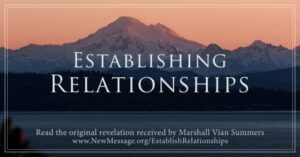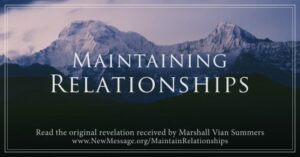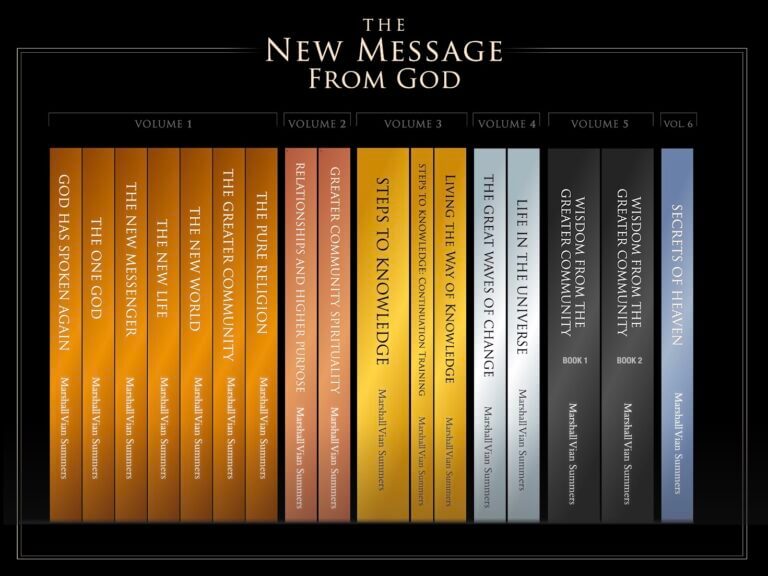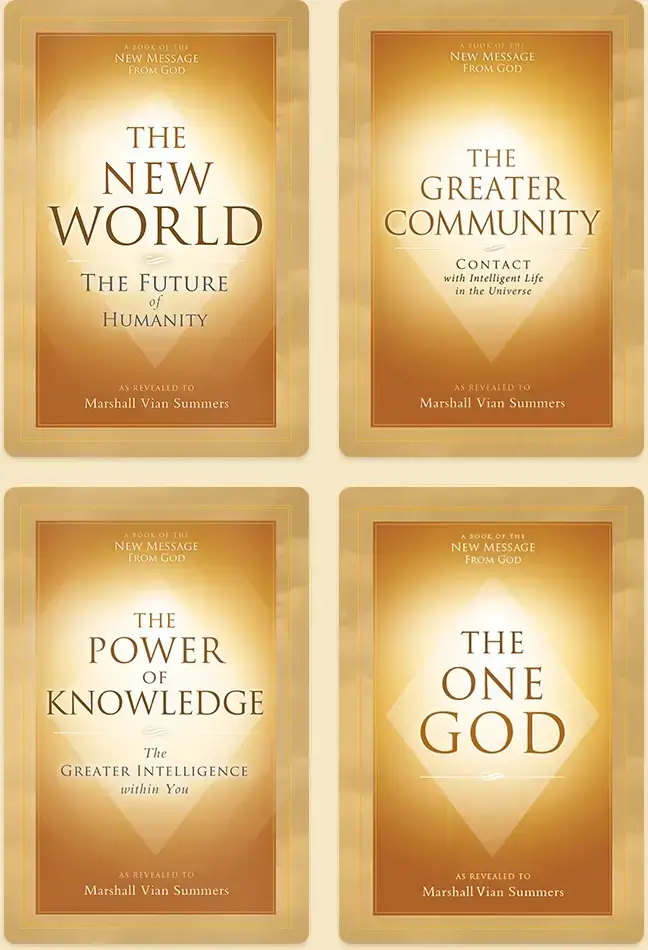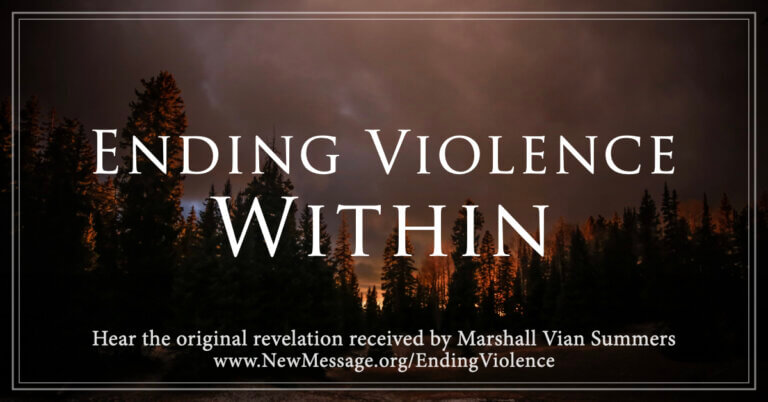
Marshall Vian Summers
on September 4, 2008
in Rocky Mountain Park, Colorado
Hear the original spoken revelation:
Download (Right-click to download)
While people abhor violence, and condemn violence, and seek ultimate punishment for those who are engaged in certain kinds of violence, they often fail to see the degree of potential violence within themselves.
People love to watch violent movies, or pay close attention to catastrophes or battles or wars, as if they have an appetite and a thirst for violence. You see this all around you. It is not a mystery.
Look at the movies that people watch. Look at what is portrayed in the news media. Look at what fascinates people’s imaginations. As long as there seems to be justice in violence, violence is often condoned. If violence appears to be unjust, it is condemned. But what about the violence within the person, within the people who are engaged in violent activities? What about the violence within you?
To seek gratification or stimulation by observing the suffering of others means that you have a tendency within yourself, an appetite within yourself, that must be satisfied through these things. You might think that violence is terrible. It might be abhorrent. You cannot even speak of it perhaps. But there is something within you that has the potential for violence and may already be violent.
What is condemnation but controlled violence? What is admonishing others but a controlled violence? What is the rejection of other peoples and nations but a controlled violence? If your mind is turbulent, if it is restless, if it is agitated, if it is filled with anxiety and resentment, then it is a well for many things, including violence.
In facing the Great Waves of change that are coming to the world, which will create great pressure on people and great difficulty, even in the wealthy nations, the veneer of civility will wash away, revealing the deeper and more genuine state of people at this time.
People who are cultured and polite will become angry and vengeful. People who seem sophisticated will act like animals. The Great Waves of change— which will bring violent weather, the depletion of resources, increasing economic and political instability and the growing risk of conflict and war—the darkening of the world, will push people over the edge.
They cannot be tolerant any further because they are losing their jobs. They are losing their homes. They are losing their social and political power. They are facing ever greater uncertainty. Vast networks of corruption will be revealed. Human incompetence will come to the surface in governments, religions and commerce.
People will be enraged. They will be frustrated. They will be very frightened. Tolerance will melt away like ice in the sun, and the potential for violence—not only between nations but between people, between groups of people—will escalate, requiring more government control and suppression of personal freedom.
What can you do about this? If you really believe in peace, then you must address the potential of conflict and the reality of violence within yourself. You cannot demand peace of other people, peaceful behavior or peaceful attitudes, if you yourself cannot demonstrate this in your relationships with others, in your relationship with yourself, and in your relationship with your nation and your government and the world at large.
People demand peace, but they are not peaceful. They want peace so they can continue to engage in their personal pursuits without anyone else needing anything from them, without having their goals and plans interrupted or interfered with. It is as if they are saying: “I want peace so the world will not bother me, so I can continue my personal obsessions, my personal pursuits, without anything getting in the way.”
And when people have relative peace, they do not know what to do with themselves. They become addicted to things. They race around like a mad person. They cannot sit still for five minutes. They require constant stimulation. Their mind is full of nervousness and agitation. They do not have any real deeper sense of themselves or where their life is going.
Look at the decay of people’s ethics and behavior in an environment of relative peacefulness. One could say people do better in war than they do in peace. They are more selfless. They are more giving. They tend to be more compassionate in certain situations. But of course war is destructive, and it sows the seeds of conflict for the future, so you cannot find purpose in war. For that is not the purpose that you came into the world with. If it takes war to have you rise to a greater occasion, to recognize greater needs, to become more selfless in your approach to the world, that is unfortunate and a sad testament.
People want change. They want the nation to change. They want the city to change. They want the culture to change, but they do not want to change. And on top of that, they want peace. They want change. They want peace. But change is not very peaceful. When people are facing real change, it is disturbing. It is an upheaval. It is stressful. It is difficult. It is uncertain.
Have you ever gone through any kind of real change in your life in a state of equanimity? Of course not, not if you are honest with yourself. It was difficult. You were resistant. You struggled. You were angry. You were frustrated. You blamed other people. You blamed yourself. You fought the change. You denied the change. You put it off. Now tell the truth to yourself here. Was this a peaceful experience?
How can people go through change without going through revolution, without unleashing all of their potential violence and conflict upon one another? Relative affluence has a moderating effect, but in facing the Great Waves of change, many people will be losing much if not all of their affluence, so all of these moderating effects will be removed.
Yes, people will be changing. They will be forced to change. They will be changing against their preference and their will. They will fight and they will struggle. And they will blame and they will condemn. That is what real change brings out in people, even if that real change has a valuable and necessary outcome.
What would happen if you lost your job and your home? Would you be peaceful around that, particularly if you had no control over the circumstance, if it was just pulled out from under you? Would you take that in stride with a passive attitude?
Even if you instigated the change based upon the movement of a deeper Knowledge within yourself, you would still go through the upheaval and the upset and the self-doubt and the frustration and the anxiety that that change would produce.
So do not demand great change and at the same time expect peaceful relations. If you have to change your relationship with someone, and you realize you cannot go forward in a relationship with someone, would that be peaceful and elegant? No, not if you have a deep attachment to one another, or one of you has a deep attachment to the other. It would be really difficult, painful, upsetting.
If you are the person leaving, you will feel guilt and shame and uncertainty and great doubt. If you are the person being left, you will feel abandoned and cheated, manipulated perhaps, used, abused and so forth. That is change.
That is why most people talk about change, but do not change. They want other people to change. They are afraid of change. And one of the things they are afraid of is a fear of themselves—what would come to the surface in their own minds?
One of the reasons that people do not change things that they know they must change is the self-recrimination that comes with realizing that you should have made this change years ago, and what on earth have you been doing all these years, compromising yourself in a situation that you should have resolved years ago? This self-recrimination can be very strong, and it is one of the factors that keeps people from taking action regarding change that they know they must make in their relationships and circumstances.
Many people in the face of this simply capitulate and go back into their compromised state where they will not feel what they feel. They will not know what they know. They will just try to make the best of the situation. Perhaps they will be philosophical regarding it and say, “Well, wherever God wants me to be, I will be,” as if God is the source of their problems. Or they will try to make a situation that is not working look better than it is by highlighting its benefits and its potentials and so forth.
These are all forms of self-deception, of course, but one of the reasons that people take this form of action, which is not in their best interests, is to avoid dealing with what they will feel within themselves. They are afraid of their own feelings. Having never really built a deep relationship with themselves, now they are afraid of what is inside of them—afraid of anger, afraid of grief, afraid of feeling out of control. And this, of course, is the source of much mental illness and human incapacity.
So what should you do? It is important within yourself to build a connection to the deeper Intelligence within you. For despite however much fear and resentment and uncertainty you may be holding within yourself, this deeper foundation of Knowledge, this deeper Intelligence that God has created within you, is certain. It is uncompromised and uncompromising.
It knows who you are, where you need to go, what you need to do, what you need to avoid and what you must seek. It is waiting to be discovered within you. And as you take the many steps that will be necessary to approach this greater Intelligence and to build a conscious connection with it, you will lessen the impact of fear, anger, and violence within yourself.
In a civilized state, people’s more dangerous tendencies are held in check. Through social structures, through civil expectations, through even a moderate degree of affluence; through retribution or through facing the consequences of failure, through the threat of imprisonment or social rejection, people’s more dangerous tendencies are held in check.
So here civilization has a moderating effect overall even if the civilization is full of difficulties. But the real problem of violence within yourself is not being resolved, even if its outward manifestations are held in check. It is still there to haunt you. It is still there to endanger you, to lead you to self-destructive behaviors, and to make terrible mistakes in your life. How do you resolve this within yourself?
If you fight evil, it becomes stronger. Evil loves attention. It thrives on attention. It is really something that is unreal in itself, but as more attention is given to it, and the more it is rejected and resisted, which is another form of attention, then it remains strong, and it has a powerful potentiality, a powerful potential. If you fight evil within yourself, you will not be successful because you are feeding it as you fight it.
What is important is to make it unnecessary. For what is the potential for violence within yourself but a well of fear and uncertainty that you have as a result of being separated from your greater Source.
Here you are, alone in the world—you are supposed to create your own reality and make your own way, make your own decisions, struggle to stay above water, avoid numerous and even unexpected dangers, try to get along with other people who are not necessarily supportive of you, and may even oppose you.
You are in this situation without the strength and the power that God has placed within you, in the deeper Knowledge within you. As a result, you are aggressive, or you are submissive; you are hateful but pretend to be loving; you are full of uncertainty and conflict; you are aggravated by innumerable things, and if life takes away too many of your advantages, you become violent and dangerous; you engage in self-destructive behaviors; you admonish and reject other people.
You are just like what you see in the world today, underneath whatever the pretense that people are putting forward. You have all of this pathology within yourself, even if you appear to the outside to be very much in control, and very smooth, claiming to be aware and spiritual and enlightened. That pathology is still there.
How will you undo it? How will you weaken it so it does not cast a pervasive, everlasting cloud over your life and influence your decisions, and spoil your relationships, and ruin your ability to enjoy life in the moment and to prepare wisely for the future?
Certainly, you will have to make decisions regarding certain kinds of behaviors. And you will recognize, if you give this your attention, that there are certain procedures and methodologies for replacing self-destructive behaviors with behaviors that are constructive for you and for other people. You will perhaps find very powerful methodologies that can help you.
Perhaps you will find a very competent teacher or set of teachers that can assist you in rehabilitating your life, and in giving it greater strength and balance. Perhaps you will turn to religion and believe that your worshipping of God will give you strength and that God will infuse you with blessings and purity.
But the question arises: What will give you the power to overcome the potential for evil within yourself? Not only to hold it in check, but to weaken it significantly to the point where it cannot govern you even if you are facing deprivation and difficult circumstances?
People think the methodology alone is enough: “I have found this wonderful teaching. It has a practice. I will practice it. It has a methodology. I will use it.” But they soon find out they really do not have the strength to implement it and to consistently apply it. Perhaps their ship has sails, but there is no wind. There is no power within them to move them forward.
That is why at the source of all of this, even if you engage in very healthful activities and establish a more positive attitude, you must still find the power of Knowledge within yourself. For only it has the strength and the conviction and the commitment to break the chains that hold you, and to deflate the potential for evil and violence, to release you from constant aggravation and a feeling of constant inner restraint.
If people do not find this source of power and guidance within themselves, then they are relying upon their will power alone, and for most people this will not be sufficient. A few will be able to overcome their obstacles and build a new foundation for themselves, but even this foundation will not really be successful in facing the Great Waves of change. You must have the power that God has placed within you to do this.
Do not think that by the sheer force of your personality that you can break the chains that bind you, that you can lift yourself up. You will need all of your strength to undergo real and constructive change in your life, but you will need the power of Knowledge to fuel your actions.
Do not fall into the trap of thinking that you have to do everything, or you just sit around and God does everything, as if Grace takes care of all of these problems—fixes your leaky roof, fixes your broken relationship, fixes your compromised and neglected health, and can enable you to overcome your fixations or obsessions and addictions.
It will take the strength of your will, your personality, your physical strength, your personal determination, with the power of Knowledge to break the chains that chain you to the wall, that keep your mind in a state of constant aggravation, that breaks addiction and obsession.
For Knowledge is not addicted. It is not obsessed. It is not angry. It is not violent. When you see the difference through experience between the reality of Knowledge and the state of your personal mind, you will see very clearly the great difference. And you will see who must be the master and who must be the servant. You will see where the source of strength is within yourself, and you will see the weak condition of your mind and the compromised state of your life.
Do not think that you are where you are in life is where God wants you to be. That is so very rare. You have a mountain to climb. You have movement to make within yourself and in the world around you.
Most people are not where they need to be. They have fallen asleep on the side of the road, or have built mansions for themselves on the lower slopes of the mountain. And now they are trying to be happy, comfortable, and fulfilled there. But everyone has a mountain to climb to find their real gifts, their real contribution to a world in need.
Rich and poor, people are held back. The poor are held back circumstantially to a very great degree, but so are the rich in a very different way. It is more tragic with the rich because they are more deluded. They are more prone to fantasy about themselves. They have more addictions to break, more fixations to escape, more delusions to retreat from. They are less honest than the poor and less aware of the realities of life.
When the rich get angry, the country goes to war. If enough poor become angry, well, then you might have revolution, but revolution is costly and destructive and rarely achieves its stated goals, replacing one set of overlords with another.
Your task is to take the Steps to Knowledge. Then whatever you do that is beneficial will be empowered by the presence of Knowledge, and whatever you try to do that is not beneficial will be restrained by the power and the presence of Knowledge.
God is not going to swoop down and wash away all your sins, as an immense act of Grace. God is not going to dispel your illusions and your fantasies, your addictions and your tragedies. God has placed a perfect guiding intelligence within you. Without it, you are lost. Rich or poor, you are lost.
Your life is empty, whether it be filled with pleasure and attachments and possessions, or whether it is bereft of these things. You are swayed by the world. You are swayed by your passions. You have no control over yourself that is real and genuine. You are addicted to power or to pleasure or to persuasions of one kind or another. You are impoverished at the level of your soul.
That is why while there is much effort that must be made on behalf of humanity, and there must be much effort exerted for the redemption of each individual and for the correction of humanity’s great mistakes; and while there must be tremendous cooperation in preparing for the Great Waves of change that are already striking the world in so many places, at the core, you must have a foundation in Knowledge and be grounded in Knowledge.
This is not the same as spending 30 years in meditation trying to be enlightened. For Knowledge will guide you in the world. It will weaken your attachments. It will undo your dilemmas slowly, but deeply. As you become closer to Knowledge, it exerts a greater influence over you, and you begin to settle down into your deeper nature.
You are faced with decisions. Your mind wants something that Knowledge does not want, and you will have to face this conflict, this dilemma. You want a person, a place, or a thing. Knowledge is not going there, and you cannot make a deal. There is no making deals with Knowledge. It has no interest [there].
Do you see here? If you choose with Knowledge, you are defying your passions, your obsessions, your fantasies. You are choosing something else. You will not be certain in your choice. You will be full of doubt perhaps, and you might even feel a great sense of loss that you are not going to have this desired person, this place or this thing, whatever it might be. But you have given strength to Knowledge.
Because, you see, only God knows how to redeem you. You do not know. You cannot do it on your own. You cannot lift yourself up off the ground. Here you must learn to receive and to choose, and to honor your choice, and to bring your personal power to bear to follow the right choice that you make with Knowledge. If Knowledge is not going for this person, this place or this thing, you should not be going there either.
For Knowledge is trying to take you somewhere in life. It is trying to take you to a set of circumstances, and to meet certain people, and to have certain experiences and realizations that will begin to reveal to you your greater purpose for coming into the world, which is barely reflected currently in what you think and in what you do.
That is why the New Message Teaching that God has sent into the world provides the Steps to Knowledge as a part of its essential teaching. While many things are directed and recommended for successful and harmonious living in a changing world, there must be this fundamental connection at the center of it all: as if this were the hub of the wheel, and that everything you do radiates out of this hub and is influenced by this hub—who you are with, the work that you do, how you view the world, how you respond to difficulties and failure, how you face change, the degree to which you have the strength and the wisdom to make positive change in your life. All of this power emanates from Knowledge within you.
Without this, you are weak and, in most cases, do not have the strength to overcome the real obstacles that are affecting you. God knows you cannot do this alone, so God has given you Knowledge. God knows that without Knowledge, you would try perhaps very hard, but you know, you would constantly be swept up by the world, constantly overtaken by this force or that force, this emotion or that emotion, this reaction or that reaction.
The world is full of these persuasions—social movements, political movements, personal anguish, control of your family, social obligations, religious edicts. Everything is pulling on you from the outside. Where are you going to find your real connection to God and the strength that God has given you? That, in and of itself, with your awareness and your cooperation, will undo the seeds of conflict within you.
You will still have emotions and feelings, sure. You will still get bothered by things, certainly. You are not going to be dead. You will still be affected by the world. You will feel tragedy. You will be upset by violence. You will be disturbed by the suffering of people. You will be annoyed by people’s stupidity and cruelty, but the difference is that all of these reactions and emotions will not change the course of your life, which now has a greater power directing it.
But you must be very patient, you see. This is part of what undoes your restlessness, your aggravation, your irritability. It is because the journey is slow. You want the journey to happen now. You want the results now, as if you were purchasing something from a store. You pay your money; you want to get what you want. You want strength; you want certainty; you want real direction in life. You want it now. Don’t you? Oh, tell the truth here. You want it now.
You do not want to have to work for it, but you will have to because the journey requires it, because the journey is where you gain wisdom and strength and power, where you see how Knowledge works, where you gain enough skill that you can be of service to others in the future.
People think that becoming healed or authentic in their life is a kind of dispensation from God, but really the potential for this is within them at all times. But for many people, it is like having to backtrack. They went so far off course in life that they have to find their way back because if you are lost, you have to find your way back.
In doing so, you begin to review and recognize your former errors. You begin to undo the motivation that took you off course to begin with. You begin to recognize the mistakes you made along the way and to realize what caused them, and why you gave in to them. This is all wisdom building, you see. For the journey is not simply to get you out of trouble. It is to make you powerful and wise so that you may be of service to the world.
That is why God does not cast a wand over you and make all of your troubles go away, as if you are on welfare of some kind. You have to backtrack. Your life went off course some time back there. You have to work your way back. Just as if you were lost in a big city, or in the wilderness, well, you have to backtrack, try to figure out where you lost your point of certainty, beyond which you didn’t know where you were or what you were doing.
It is here that you realize your mistakes. How would you ever know how you ended up where you are today if you did not backtrack? You would not even realize where you went wrong, where you made a bad decision—in fact, not only one but many. And with each one you became more disassociated from yourself, more estranged from yourself, more caught up and lost in the world.
People do not end up where they are by accident, you see. There are decisions and circumstances. So there is a certain amount of backtracking here that must take place. But while you are backtracking, you are also building wisdom and clarity and strength.
Most people, you see, do not want to backtrack. They want to keep on going from where they are. They want to now become enlightened or powerful or successful. They want to heal their relationships or resolve their emotional difficulties right where they are, but they are lost. They do not want to have to go back and see where they were and do a review of their life in a very conscious way. They just want to have certainty where they are. But they lost their certainty some time ago, and they do not know when, where and how they lost it.
These are things you must discover because you must have wisdom if you are to be of service to others. How will you know how to support the renewal of someone else’s life if you have no idea what the renewal of your life is, and what it required, and what you had to learn in the process of going through this renewal?
This is very important to understand because there are many mistakes along the way, and this unwillingness to backtrack is one of them. That is why the New Message teaches you how to review your life and emphasizes this so you can see in your own experience, in your own history, where your life went off track, and what motivated you to make unwise decisions.
What were the forces within you and in your environment that encouraged you to make a wrong decision in a relationship, for example, or to commit yourself to a career that never really could fulfill you in any real way?
You must recognize this within yourself and in your environment, both presently and in the past: What has held you back? You cannot guess here. You cannot just make an assumption. You must really find this out because if you do not realize what undermines you, then it will continue to undermine your forward progress.
If someone is lost in the wilderness and sets a path for themselves, they could become more lost. They might choose to go west when they need to go north. They do not know where they are going. They do not know what they are doing. They do not even know where they are.
Even if you have to backtrack a hundred miles in the wilderness to get back to the point where you knew where you were, where you had provisions and stability, then that is what you have to do.
This deep evaluation of your life is so important, and it must be done with as much clarity and objectivity as possible. This self-evaluation, the evaluation of your life and history, is very significant because it will show you the evidence of Knowledge at each turning point. You will see there were signs and inclinations that you should not have done what you did.
Perhaps you felt the restraint within yourself. Perhaps someone else warned you. Perhaps you made your decision with a sense of deep resignation instead of joyful anticipation. What was that like for you? Because you need to know that when you meet the next turning point, the next fork in the road, you will know the powers that will lead you in the right direction, and the forces that will lead you in the wrong direction.
If you go on without having learned this, well, you will just make the same mistake again. Perhaps it will be under different appearances, but really, perhaps you will be seduced by something else. Before, you married someone because they were handsome or beautiful. Now you are going to marry someone because they look to be spiritual, making the same mistake all over again—neglecting the signs and the symptoms that you were making the wrong decisions and forging ahead, either willfully or in a state of resignation. What can God do for you but amplify Knowledge within you?
The examples here are too numerous to mention, but as you begin to do a review of your life in your deep evaluation, well, you will begin to find them. Going back, where did you make the critical decisions that had to do primarily with relationships with people, with places, with forms of work? Go back to each one of those junctions. What was it like to be there? What encouraged your decision? And what, if any that you could recognize, were the signs indicating that you should have done something else?
Know these signs. Acquaint yourself with them fully. Remind yourself of them every day because those signs will be there for you in the future. And those forces that led you astray will be there in the future because the world is full of these forces.
Now you must guard your mind and your decisions carefully. Not bringing fear, but great caution and discernment to your engagements with people and to what attracts you. You bring everything to Knowledge. You learn to do this through taking the Steps to Knowledge. And you learn to do this because this is your primary education.
You may praise God and worship God, but God only wants you to do what you came here to do, what you were sent here to do. You will only honor God by doing that. And if your life has gone off course, you must go back and re-examine this so that you can move forward with greater discernment, greater clarity and greater strength.
Then what is restless and violent within you will become subdued. The power that reinforces it will be diminished. That power will now be exerting itself in another direction.
Here you will find greater strength, greater certainty and greater self-awareness. You will not be so easily seduced by the allurements of this world. You will not be so easily swayed by other people’s opinions. Wealth, beauty and charm will have less and less effect upon you, for you will be looking for something deeper in people—the very depth that you are working to find and to keep alive within yourself.

